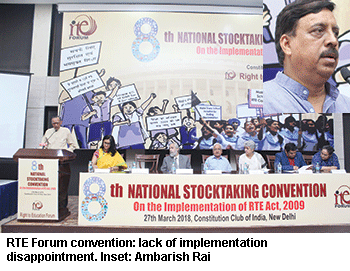 AS THE RIGHT OF CHILDREN TO Free & Compulsory Education (RTE) Act, 2009, which became law on April 1, 2010, nears its eighth anniversary, heated debates about its efficacy are breaking out all over the country. In the academic year 2018-19, the first batch of children from socio-economically backward households enrolled in neighbourhood private independent (non-minority) schools, which were obliged under s.12 (1) (c) of the Act to admit them free-of-charge into class I and retain them until completion of class VIII, will graduate.
AS THE RIGHT OF CHILDREN TO Free & Compulsory Education (RTE) Act, 2009, which became law on April 1, 2010, nears its eighth anniversary, heated debates about its efficacy are breaking out all over the country. In the academic year 2018-19, the first batch of children from socio-economically backward households enrolled in neighbourhood private independent (non-minority) schools, which were obliged under s.12 (1) (c) of the Act to admit them free-of-charge into class I and retain them until completion of class VIII, will graduate.
Meanwhile, contrary to the expectation of the framers of the RTE Act, poor neighbourhood households began exerting pressure for admission not only on upscale private primaries but also on the country’s estimated 450,000 budget private schools which can ill-afford to dispense free-of-charge education. This situation has been worsened by the reluctance of (state) governments to pay private schools which admitted poor children into classes I-VIII, partial compensation mandated by s.12 (2).
Therefore, it’s unsurprising that at the 8th National Stocktaking Convention of the RTE Forum (estb.2010), a coalition of 10,000 civil society groups, NGOs, teachers associations, educationists and activists from across the country, held in Delhi on March 17, almost all keynote speakers expressed disappointment with the implementation of the Act and called for a “people’s movement” to ensure its proper implementation.
With the General Election just a year away, delegates issued a clarion call for shedding the “lackadaisical approach” of the Union and state governments towards universalisation of primary/elementary education and condemned their disinterest in improving government schools.
“We need to make parent communities countrywide aware of the lack of enthusiasm of the BJP government at the Centre and in the states to improve government schools. In 2014-15, the primary education (SSA) budget was Rs.28,262 crore. Four years later, it has dropped to Rs.26,162 crore. There’s little evidence of attempts to improve teacher education in government schools or to fill teacher vacancies which have risen to over 1.3 million countrywide. As a result, children are fleeing from government to fees-charging private schools. Neglect of government schools and commercialisation of education seem to be the Central government’s game plan,” says Ambarish Rai, national convener of the RTE Forum, who adds that government schools are the “last check-posts of democracy” and need to be defended.
Citing the report of the Comptroller and Auditor General (CAG) 2016, which was released recently, the draft report of the RTE Forum comments: “Twenty of India’s 34 states and Union Territories fall below the national average of 8 percent compliance with the RTE Act; 13 states have less than 3 percent schools fully compliant with the RTE Act and 18 percent of states do not have even 1 percent of schools compliant with the RTE Act.” In this connection, it’s pertinent to note that the RTE Forum’s annual reports of the two years past had been warning that only 10 percent of primary schools countrywide were RTE-compliant. The CAG Report 2016 released last year confirms this conclusion.
The BJP/NDA government’s stated intent to repeal the “child-friendly” s.16 of the RTE Act, which prohibits the detention of any child in elementary school (classes I-VIII), also came in for severe criticism at the RTE Forum’s stocktaking convention. According to the general consensus at the convention, detention of a child in primary class is tantamount to punishing her for no fault of hers. “The Central and state governments haven’t understood the spirit of the RTE Act, which is experiential learning, involving children in exploration, discussions, critical thinking and so on. They should focus on training teachers to implement the CCE (continuous and comprehensive evaluation) system where children themselves would willingly become involved with their evaluation. This was first botched up by CBSE, which actually has no business with elementary education. The Bill to amend s.16 has yet not been passed. Let’s all forcefully defend this provision, or else the right to education becomes illusory,” says Dr. Anita Rampal, professor of education at Delhi University, who was instrumental in conceptualising CCE.
Criticism of the ill-designed RTE Act is becoming louder and widespread. On the left, there’s mounting criticism of BJP governments’ lack of urgency to upgrade and improve public schools. On the other hand, classical liberals are cheesed off by the BJP/NDA government’s reluctance to liberalise and deregulate the education sector by encouraging — instead of hobbling — private initiatives in education.
Autar Nehru (Delhi)























